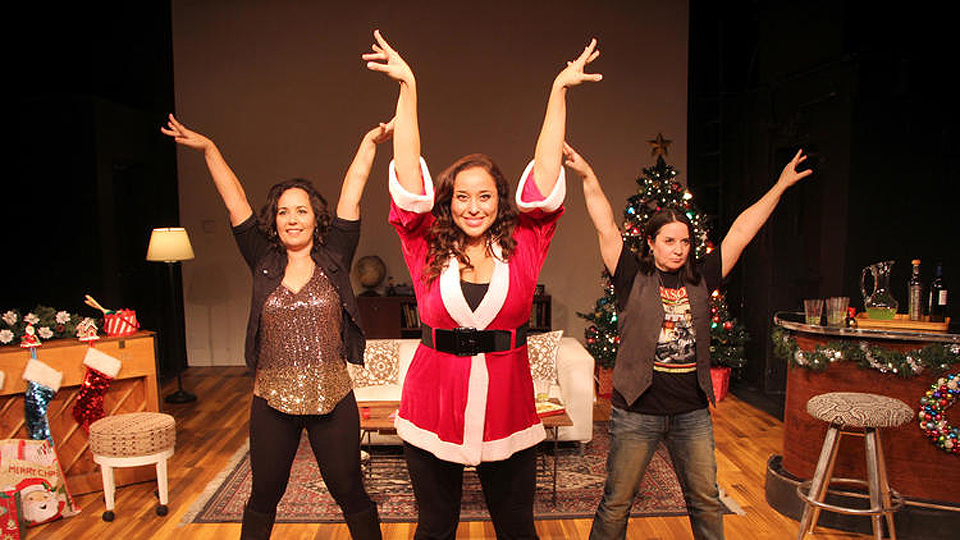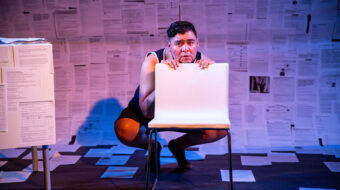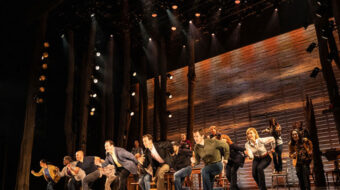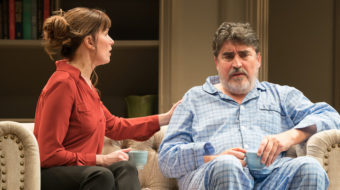
LOS ANGELES — Los Angeles County alone contains 4.9 million Hispanics (about half the county’s inhabitants), or 9 percent of the nation’s Latino population. A metropolis this big has at least some outlets for theatre based on Latin American themes, where Latinx (which is a gender-neutral way of referring to the Latino community) actors, directors, writers and allied professionals can show their merits.
Three recent productions, two of them running until December 18th, touch on Latin American life in Uruguay, Argentina, Cuba, Mexico and the U.S.
Downtown’s Los Angeles Theatre Center offers the Latino Theater Company’s production of The Latina Christmas Special, featuring three lusty comedians, Diana Yanez, Maria Russell and Sandra Valls. Earlier this season the company gave us the monumental A Mexican Trilogy: An American Story.
Yanez has said she created the show “as an homage to all those TV shows we watched growing up — all those ‘Christmas Specials’ that we so closely identified with the holidays but had no Latinos in them (or maybe just José Feliciano).” Although Latino families retained their food and other holiday customs, the seasonal trappings of snow, tinsel and pine trees, Santa and his reindeer, all became incongruously slapped onto the landscape of Florida and the Southwest.
The 90-minute romp has the three of them celebrating around the Christmas tree and a piano, bolting down tequilas, cracking lewd jokes, and just being generally tacky, dishing about everything from moms to cucarachas to Farrah Fawcett. Each in turn stands in the spotlight with her Christmas memories, recalling how these immigrant families adapted to life in these whitewashed United States. None of their lives became the American Dream their parents hoped for, as bad marriages, nonstandard career choices and alternative sexualities set in. Still, those families had love and protectiveness, humor and music, and Telemundo-worthy escándalos we can afford to laugh about now.
Directed by Geoffrey Rivas, the show includes historical photos and film footage of the young girls, with their families, home décor and toys. These kids’ problems around the holiday had an ethnic inflection, but resemble everyone’s problem: How to remember the meaning of Christmas amidst the swirl of tasteless, excessive commercialism.
L.A.-born Maria focuses around being an especially indulged child with a weight problem, although Sandra and Diana say she’s not fat, just “healthy.” Aspirations of becoming a ballerina with a Barbie body just do not happen. Diana’s parents left Cuba as a young married couple and settled in Miami. She delivers a hilarious dissertation on the multiple applications of the word coño, and relates how her kid brother became a fan of the Village People, and grew into a kick-ass queer man.
Sandra’s is the last cameo, and the show’s most poignant. She was a tomboy from the start, crestfallen each year when her Christmas gifts included yet another unwelcome doll. In her Texas Mexican household, Christmas Eve was for the “real” presents, and Christmas morning for Santa’s presents. Finally, one year, that morning brought her the heavy construction toys she wanted. “Santa heard me, Santa knew me, Santa saw me — and isn’t that what a gift should be?” Sandra wound up being somewhat resentfully her mom’s full-time caretaker until one Christmas her sister told her, “You can continue to mourn the mother you used to have or to celebrate the mother you have.” “It’s not what you have to do,” Sandra concludes, “it’s what you get to do.”
Carlos Gardel and the tango
Every lover of Latin music knows that the singer, songwriter and film star Carlos Gardel, brought to Buenos Aires as an infant by his unwed French mother, almost singlehandedly transformed the tango from the lowlife barrio song accompanied by guitar or bandoneón into the heady, romantic, orchestrated hit tunes that lifted the dance and song form into a worldwide craze.
Gardel’s Tango, called “a play with songs,” was written, directed and produced by John R. Lacey. Many musicals and musical plays focus on a person, a singing group or a genre, and Gardel is certainly deserving of this kind of attention.
Lacey’s central relationship is that between Gardel (Anibal Silveyra), first seen selling fruit on the streets of Buenos Aires, and José Razzano (Richard Lewis Warren), an older singer of lovelorn ballads whom Gardel tried to emulate. In time, the student surpasses the maestro, who by the end is begging for any little job to do to stay connected with the Gardel phenomenon. Another key figure is Gardel’s collaborator Alfredo Le Pera (Agustin Coppola), who elevated the tango lyric into poignant folk poetry. In his classic song “Volver (Return),” “las nieves del tiempo platearon mi sien” — “the snows of time have silvered my temples,” a fact I can well attest to now these many years since I first heard Gardel’s songs.
Three women also have roles in the play, as well as one unnamed dancer (Hollie Sokol). These are Gardel’s mother Berthe (Hildy Brooks), who adores her son (originally Charles) and clutches him too close for comfort; Gardel’s sometime romantic partner Isabel (Mantha Balourdou), young, shapely, whiney and petulant; and the Baronessa (Saratoga Ballantine), an elderly patroness of Gardel’s in Paris (where Act II takes place) whose husband’s fortune is in Russian tobacco. These women are little more than stock figures, showing no real growth throughout the play, although we do get a glimpse of an uninvited lesbian seduction.
Le Pera’s character might also have been developed more. It’s stated more than once that he’s a gay man, but we don’t know him as such. Working with Gardel was unquestionably the high point of his life, but might he have been maybe un poquito in love with the tango crooner? The entire play revolves so dizzyingly around Gardel himself, through multiple blacked-out scene changes and much tiresome drinking, betting and womanizing, that other characters have little chance to become real three-dimensional persons who interest us very much.
Silveyra is exceptionally well-cast as Gardel. He looks uncannily like his character, and approximates his singing voice adequately enough in mostly English-language versions of the biggest hit numbers. Maman Berthe of course has a French accent, Gardel his presumably Buenos Aires intonation, Le Pera a generally Latino sound. Razzano, however, has an urban tough-guy American voice, with no attempt whatsoever to sound anything Latino; the Baroness talks like a Bronx floozy (we don’t really know her background but she fits into the era’s stereotype of the American girl who marries into wealth); and Isabel has a way over-the-top Caribbean spitfire tongue. Linguistically, the show is inconsistent to say the least.
There could be a worthwhile play in this material, but so far we’re not seeing it. The physical production is fairly impressive for a small theatre staging, but the script needs an overhaul.
Federico García Lorca in Montevideo
Osvaldo Golijov, from a Romanian Jewish family, grew up in Argentina, and trained as a composer. He’s now living and teaching in the U.S. His opera Ainadamar in one long act, based on the fateful events surrounding the death of gay Spanish poet and dramatist Federico García Lorca in the early days of the Spanish Civil War, premiered in 2003 and has received numerous productions since.
His premise is that the Catalan actress Margarita Xirgu, who premiered Lorca’s play Mariana Pineda in 1927, is on her company stage in Montevideo in 1969, preparing for a final appearance in the role. Haunting flashbacks take her back to Granada where Lorca was executed by fascist forces in an almost Christ-like manner. As the preeminent heir to the Lorca performance tradition, who has preserved it for the post-war world, she now passes it on to her students.
Its 2006 recording won a Grammy Award. It is infused with flamenco, and is performed in Spanish. The libretto has a curious history: It was written in English by Chinese-American playwright David Henry Hwang but always meant to be translated into Spanish to be set to music.
The University of Southern California Thornton School of Music’s Opera Program staged the work for three performances Nov. 16 (seen), 18 and 20. In the cast I saw, Lorca was sung by a mezzo soprano (Melissa Treinkman) to emphasize the playwright’s ambiguous sexuality. Xirgu was sung by Graycen Gardner, and her Uruguayan assistant Nuria by Vincentia Geraldine. The cast also includes prisoners, fascist soldiers, and a chorus of flamenco dancers.
As a student production not aimed at a citywide audience, it did not run long. But the performance, conducted by Brent McMunn and staged by Ken Cazan, was on the highest level. Arts lovers will often be gratified to see the excellent work our young people are creating under professional supervision, offering a deep reservoir of hope in the next generation coming up.
Curiously, all three of these works have queer elements: In the Lorca opera it’s a major factor, in the Latina Christmas it’s a third of the trio, and in Gardel it’s a titillating, but incidental part of two characters’ stories, presented in one case supportively and negatively in the other. Latinx audiences seem clearly receptive to inclusive cultural representations. And now L.A. gears up for the return of Luis Valdez’ great play Zoot Suit at the Mark Taper Forum, almost 40 years since its local premiere. It will play Jan. 31-March 12, 2017.
Performances of The Latina Christmas Special take place on Thurs., Fri. and Sat. at 8 pm and Sun. at 3 pm through Dec. 18 (dark Dec. 8), plus a performance on Mon., Dec. 12 at 8 pm. The Los Angeles Theatre Center is located at 514 S. Spring St., Los Angeles 90013. For more information and to purchase tickets, call (866) 811-4111 or go to www.thelatc.org.
Gardel’s Tango plays through Dec. 18, Fri. and Sat. at 8 pm, and Sun. at 6 pm, at the Zephyr Theatre, 7456 Melrose Ave., Los Angeles 90036. For reservations call (626) 381-9767 or go to www.artful.ly/store/events/10033.












Comments